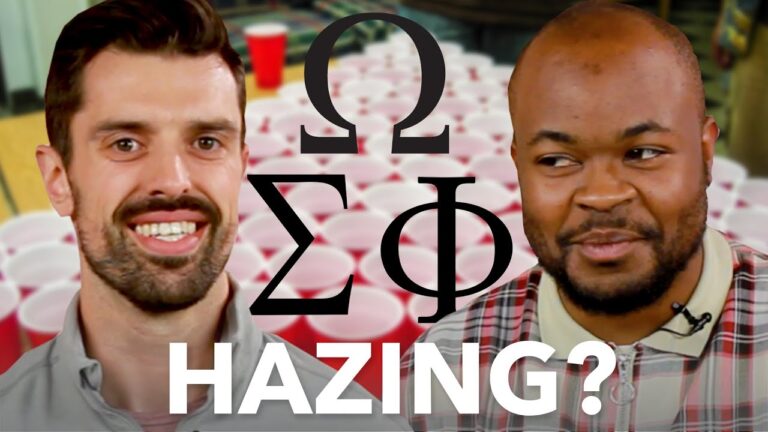^- My name’s Eddie Ulm, I went to Arizona State University ^and I was part of Theta Chi fraternity. ^- My name is Andrea Mares, I went to ^University of California Berkeley, Sigma Epsilon Omega. ^- My name is Ryann, I went to school at ^Missouri State University, I’m a Theta Chi.
^- Hi, my name is DJ, I went to Emerson College, ^Sigma Alpha Epsilon. – Fraternities actually have paddles to signify the big brother little brother process. These paddles aren’t necessarily tools, they are displays or trophies. – It’s like having a plaque, or like, having something that kind of lets you remember your time in the fraternity. – I think that a lot of fraternities do still haze, sadly. Most of it, I think, now, revolves around drinking. – In my experience, the hazing wasn’t that bad. During my sophomore year, my organization SAE abolished pledging. Like, yeah, we had to drink a little bit here and there
But it was mostly, you know, memorization, learning, you know, the chapter history. – Fraternities are not business, they’re non profits. So they don’t make money in the sense of like, we have this money and now we’re keeping it but I mean, fraternities have dues. – A portion of that due goes towards your chapter. Another portion goes towards your region
And your, some goes to like, the national organization. – They have the real estate, they have the time, they have the community and when you combine all three of those, you have a party. – My fraternity was actually a social one and the main focus was to connect queer folks and allies so a lot of it involved like, social gatherings. – Yes and no. You’re gonna meet a lot, a lot, a lot of interesting people. Those people are your friends for life. – If you are truly being yourself and you’re around guys that like you for you, you’re not just paying for your friends because they’re gonna actually know you
And actually care about you and know who you are and like you. Yes, you’re paying to be in the fraternity, but you’re getting something more out of it. – Well, I don’t think I was just paying for friends. I think that I was really giving my money towards building a community
That I really felt at home with. – I do think fraternities get a bad rap. Some of them are deserved, some are not. Unfortunately, there are chapters that do terrible things and don’t care about being better people and so those chapters get thrown in the news and it makes it seem like everyone’s bad.
– As a whole I do think a lot of fraternities a lot of chapters get a bad rap. A lot of kids are really good kids who put an emphasis on community service, giving back to different charities and what not. There’s a big reason why almost every chapter I can think of
Has some sort of fundraising chair. – I don’t think it should get the rap that maybe people perceive it to get because it does a lot of good for the individual that is fresh out of, you know, their home life, their home experience. – At my school, there wasn’t a lot of diversity. That is just true in my fraternity. There was definitely a year when I was the only black guy and for me, I didn’t feel unwelcome. There were definitely awkward occurrences and there would be moments when people would say something that was offensive
Or something that was like, borderline racist, and I would have to call it out. Like, there were definitely, it was a learning experience for both of us because I had never really been in places where I had to check someone for saying something that was racist.
It helped me grow as a person, it helped me like, kind of understand my blackness more. – As a gender neutral transgender woman, I would say that my experience at my fraternity was really unique. For folks who think that it’s a super exclusive environment
And it’s only built for a certain type of people, I would say that’s another assumption that people have, you know, and so like, really do your research and make friends and, I mean, like, if you’re interested look for the people like you who are in those spaces
And of course, you’re gonna have different views on things but differences make us stronger. – As a minority, I felt very welcomed in my chapter. My school was not necessarily the most diverse school. While my chapter was definitely more diverse, the majority of them necessarily weren’t so I think definitely seeing more minorities,
Having them not be afraid to join, of like, you know, afraid of stereotypes and what not, because you can actually have a really great time and meet some really cool people. – It helped me manage different types of people and manage being in spaces that I’m not necessarily familiar with. – Definitely, I would say, the connections and the alumni, alumni network that came with it. I came out to LA, I didn’t know anyone except for the friends that I met in my fraternity
In school, and I still am in contact and live next to a bunch of my friends that were my fraternity brothers in college. – I’d say Greek life was one of the most foundational and fun experiences in my life. I value that time, second to none.
source
